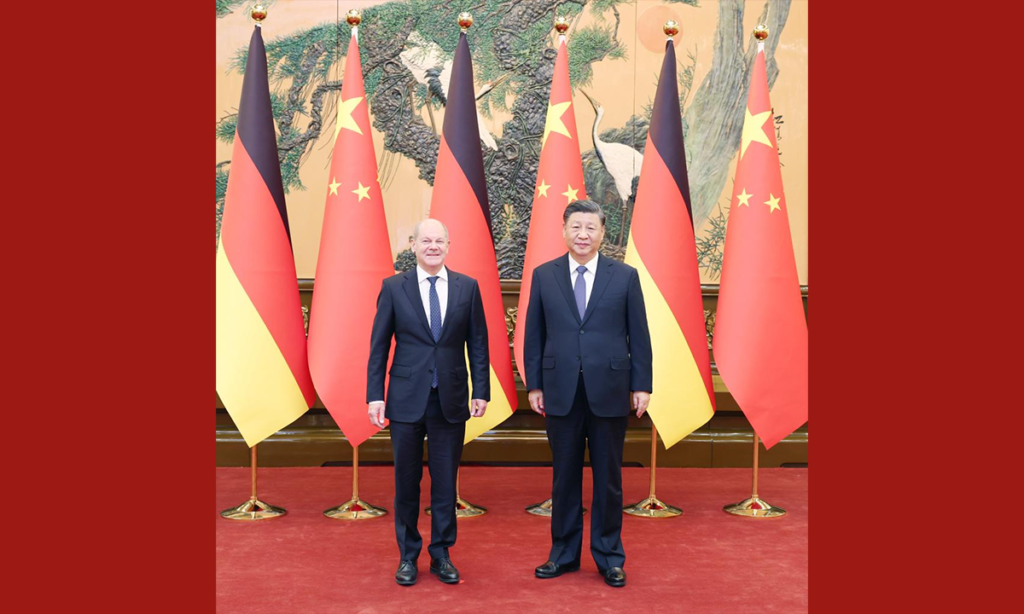German Chancellor Olaf Scholz arrived in Beijing on Friday for an official visit to China. In the morning, Chinese President Xi Jinping met him at the Great Hall of the People and held a banquet for him at the Golden Hall. In the afternoon, Premier Li Keqiang held talks with Scholz. The German chancellor’s entire visit to China was compact and efficient, and the two sides had friendly, frank and pragmatic exchanges. Although the visit was not long, it was very significant.
This is Scholz’s first visit to China since he took office, and he is also the first European leader to visit China after the 20th National Congress of the Communist Party of China and the outbreak of the COVID-19 pandemic. The trip means that the exchange of high-level visits between China on one side and Germany and Europe on the other has restarted. It will not only promote China-Germany relations to increase trust, clear doubts and deepen cooperation, but also help China-Germany and China-Europe relations continue playing their roles as the “ballast stone” in a turbulent world.
It is clear from this meeting that China and Germany expressed many common views. For example, they both emphasized increasing mutual understanding and trust, adhering to economic globalization, promoting practical cooperation, adhering to dialogue and consultation, opposing bloc confrontation, and stepping up coordination and cooperation in international affairs. Scholz again made clear his opposition to “decoupling.” China and Germany are influential forces in Asia and Europe, respectively. Their consensus not only meets the fundamental interests of both sides, but is also essential to the stability of the global economy and security.
It is worth mentioning that Xi and Scholz also exchanged views on the Ukraine crisis and issued an initiative stating that the international community should support all efforts conducive to the peaceful settlement of the Ukraine crisis, oppose the use or the threat or use of nuclear weapons, work together to keep global industrial and supply chains stable, make joint efforts to tide civilians in areas affected by the crisis through the winter, and improve the humanitarian situation. These four proposals not only conform to what China has consistently advocated, but also reflect the general wishes of China, Germany, and the international community. They also show sincerity and commitment to promoting the de-escalation and even resolution of the Ukraine crisis as soon as possible.
These indicate that China and Germany are not only highly complementary in their economies and have broad space for cooperation, but that they also share a lot of common language in their views on the trend of the times and the international situation. Consensus far outweighs differences, and cooperation largely outweighs competition. The two sides are partners rather than rivals, and both have benefited from each other’s development and pragmatic cooperation. This is a tangible summary of China-Germany ties, China-EU relations, and even China’s relationship with most countries in the world. It is on this solid and broad foundation that China’s diplomacy stands with open arms.
We have also noticed that Scholz’s visit to China this time has become a key target for some forces. Who, in the end, does not welcome, does not want, or even opposes Scholz’s visit to China? Most ordinary people in China, Germany, and Europe welcome it, because the practical cooperation between the two countries benefits them. And the business community is certainly even more welcoming. Those who create a buzz and pile pressure on Scholz are those who play with ideology as a profession, outdated European elites obsessed with their presumed superiority, and geopolitical manipulators in Washington.
Actually, the exchange of high-level visits between China and Germany and between China and Europe is returning to normal. Former German chancellor Angela Merkel visited China 12 times during her tenure. The current unique background of the times and the complex international environment make Scholz’s visit to China “special.” This also reflects the unsound tendency of Europe’s political ecology and mentality toward China, which morally coerces European diplomacy. This is what Germany and Europe need to strive to discard. As Scholz said in an article he wrote before visiting China, “Germany of all countries, which had such a painful experience of division during the Cold War, has no interest in seeing new blocs emerge in the world.”
China always regards Europe as a comprehensive strategic partner, supports the EU’s strategic autonomy, and hopes that Europe will be stable and prosperous. This position is highly stable and consistent. “Both sides should keep to the overall direction of bilateral ties from a strategic height, pursue the largest common ground in a constructive manner, and advance practical cooperation with an open mind to create conditions for long-term and steady growth of bilateral ties. There should be no self-imposed restrictions or unrealistic expectations.” This is what President Xi expects from China-Germany relations and is also worthy of reference for other European countries. To cope with the current changes and chaos and promote world peace and development, China on one side and Germany and Europe on the other need to better seek common ground while reserving their differences and working together.
(Global Times)




